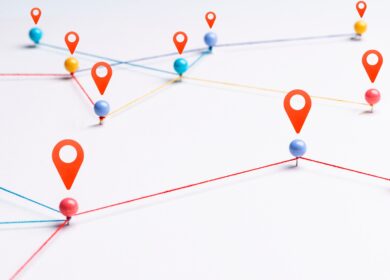
As the landscape continues to evolve and new trends and technologies redefine industry standards, we invite you to join us as we explore the frontiers of the marketing and communications world in 2024.
With 2024 unfolding, the German team at The Hoffman Agency unveil a comprehensive look into the future, presenting a series of predictions for the way brands will engage with their audiences. Read on to find out what the experts have to say.
How strengths-based leadership fosters resilient teams
Svenja Op gen Oorth, Managing Director, The Hoffman Agency
People tend to look for faults – but in the workplace, leadership that focuses on people’s strengths is crucial. Only when managers actively live this principle can they create resilient teams that can quickly and successfully meet new challenges. The key to this is a strengths-based attitude. It motivates employees and managers alike and promotes a healthy and positive workplace culture. The profitable difference of female managers is also often underestimated. They are more than a valuable asset, they are the hallmark of an exemplary corporate culture.
In the fast-paced environment of the communications industry, employees need to be able to adapt to new technologies rapidly and stay ahead of the curve. The best example of this is the emergence of AI tools, which take time to learn but are proving to be a valuable addition. However, seemingly small things such as learning new tools in the work environment can only be achieved through positive leadership that creates the necessary freedom. This is essential for the success of a company – and for the future-oriented training of its employees.
Home sweet home? It’s not the location that counts, but the result.
Ina Rohe, Associate Director, The Hoffman Agency
“If I want to network or have a coffee with my colleagues, I go to the office. I can only really work from home. I recently overheard this statement at the next table over lunch. A few years ago, this attitude would have been unthinkable – the office, the place where people used to work in a concentrated, creative and focused way, is now supposed to be a pure “networking place-to-be”? Remote working has its advantages and opens up new possibilities not only for employees but also for employers.
But for many companies, the balance between remote working and the physical office is a challenge. But does it have to be an obligation to be in the office, as SAP is currently planning to introduce? Probably not. Instead, companies in 2024 should ask themselves why employees prefer to work in the HO and then draw the right conclusions. From a communication perspective, a place where teams can meet to share ideas, brainstorm and work creatively makes perfect sense. Whether this is in the office or in a coworking space etc. remains to be seen. Employers should focus on the employee experience and create an inspiring work environment with space for self-expression. Ultimately, it should be the result that counts, not the location.
The dark side of B2C: Why your customers deserve better data
Jana Schubert, Associate Director, The Hoffman Agency
The more a company depends on its end customers, the more it needs to invest in its own IT infrastructure. Customer centricity, zero friction and flawless digital services are no longer optional – and customers’ tolerance for a poorly set up technical infrastructure is falling. The key building blocks are secure, cross-system data integration and efficient data management. On the one hand, this enables all marketing activities to be optimally implemented and ROI to be optimised. On the other hand, data quality and user experience are improved through front-end processes, such as predictive field filling. Again, AI is the big game changer, greatly improving automation and scaling. Companies also benefit from easier access to new channels and a multi- or omni-channel approach to marketing. A win-win situation for everyone.
What’s more, it ensures that companies are already covered by other regulations that are coming their way. These include the Supply Chain Act, which is already in force, and the Digital Product Passport, which will become mandatory in 2026. The basis for all upcoming regulations or the introduction of new internal systems is always the optimal orchestration of data from different sources. This includes forward-looking digital experience technologies, which will ultimately be critical to the continued success of the business.
(B2B) Influencer Marketing on the rise
Ludovica Ceschi, Account Manager, The Hoffman Agency
In 2024, the PR, marketing and communications landscape will move strongly towards influencer marketing. Influencer marketing, already a strong strategic approach in recent years, continues to gain momentum. Influencers, from micro to mega, are permeating the digital world and offering unique access to niche markets. The proliferation of influencers has led to a significant shift away from traditional media as companies increasingly look to reach a more targeted audience. In the coming year, PR campaigns will use influencer marketing as an integral part of brand extension.
Of note is the growing presence of influencer marketing in the B2B sector, particularly in the technology industry. Satisfied and engaged employees who share positive experiences and milestones on social media platforms such as LinkedIn and enhance their company’s image are becoming valuable influencers for companies looking to strengthen their brand. At the same time, experts in various fields such as authors, publicists, entrepreneurs or academics are becoming influential voices with relevant expertise for their market environment.
AI will change the media landscape
Thorsten Papkalla, Senior Consultant, The Hoffman Agency
Last summer, there was a huge hue and cry in the tech PR world: Gizmodo fired its entire Spanish editorial team and started relying on AI translations instead. Even the venerable Heise publishing house experimented with English versions of its articles, which appeared surprisingly quickly after the German originals. But entirely new formats around AI were also gaining momentum: The Decoder, a spin-off of Mixed, was an early and successful adopter of bilingual publishing in German and English.
Where will this lead? The potential to serve new markets with existing content may be too tempting for many publishers not to at least test the waters. I think a lot could happen here, especially in B2B technology media. WEKA, the world’s largest electronics editorial team with 16 editors, has been publishing selective articles here and there in English and even Chinese for a long time. The temptation might be great to anchor this comprehensive content stream more broadly in the market, true to the motto “trade journalism made in Germany”.
From New Work to Next Work: the evolution of your own skill set is imminent
Jacqueline Pitz, Account Director, The Hoffman Agency
When people talk about New Work, they usually only mean “flexible working hours” and “flexible workplace”. But this narrative needs to be broadened, because just as companies need to future-proof themselves, so too do employees. This is particularly, but not exclusively, the case for knowledge workers. After all, no one can hide from learning new skills – and skilled workers don’t magically appear overnight. In particular, the perceived Stage 7.0 of digitalisation – currently the gradual introduction of new technologies such as AI and machine learning – requires people who can use these tools appropriately. Soft skills such as critical thinking and adaptability, but also hard skills such as the use of various (AI) tools and digital expertise are becoming indispensable.
In short, employees should invest in their own upskilling now, and not just look at emerging technologies with skepticism. A spirit of discovery and adventure is the first and most important step. After all, only those with the widest possible range of skills will be able to face the challenges of the labor market with confidence.

